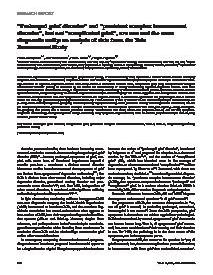“Prolonged grief disorder” and “persistent complex bereavement disorder”, but not “complicated grief”, are one and the same diagnostic entity : an analysis of data from the Yale Bereavement Study
There exists a general consensus that prolonged grief disorder (PGD), or some variant of PGD, represents a distinct mental disorder worthy of diagnosis and treatment. Nevertheless, confusion remains over whether different names and proposed symptom criteria for this disorder identify the same or different diagnostic entities.
This study aimed to determine whether PGD, complicated grief (CG), and persistent complex bereavement disorder (PCBD) as described by the DSM-5 are substantively or merely semantically different diagnostic entities. Data were derived from the Yale Bereavement Study, a longitudinal community-based study of bereaved individuals funded by the US National Institute of Mental Health, designed explicitly to evaluate diagnostic criteria for disordered grief.
The results suggested that the difference between PGD and PCBD is only semantic. The level of agreement between the original PGD test, a new version of the PGD test proposed for ICD-11 and the PCBD test was high (pairwise kappa coefficients = 0.80-0.84). Their estimates of rate of disorder in this community sample were similarly low (∼10%). Their levels of diagnostic specificity were comparably high (95.0-98.3%). Their predictive validity was comparable.
In contrast, the test for CG had only moderate agreement with those for PGD and PCBD; its estimate of rate of disorder was three-fold higher (∼30%); its diagnostic specificity was poorer, and it had no predictive validity. We conclude that PGD, PCBD and proposed ICD-11, but not CG, symptom-diagnostic tests identify a single diagnostic entity. Ultimately, brief symptom-diagnostic tests, such as the one proposed here for ICD-11, may have the greatest clinical utility.
Geachte bezoeker,
De informatie die u nu opvraagt, kan door psychotraumanet niet aan u worden getoond. Dit kan verschillende redenen hebben,
waarvan (bescherming van het) auteursrecht de meeste voorkomende is. Wanneer het mogelijk is om u door te verwijzen naar de bron
van deze informatie, dan ziet u hier onder een link naar die plek.
Als er geen link staat, kunt u contact opnemen met de bibliotheek,
die u verder op weg kan helpen.
Met vriendelijke groet,
Het psychotraumanet-team.
In: World psychiatry : official journal of the World Psychiatric Association, ISSN 2051-5545 | 15 | 3 | October | 266–275
http://doi.org/10.1002/wps.20348


